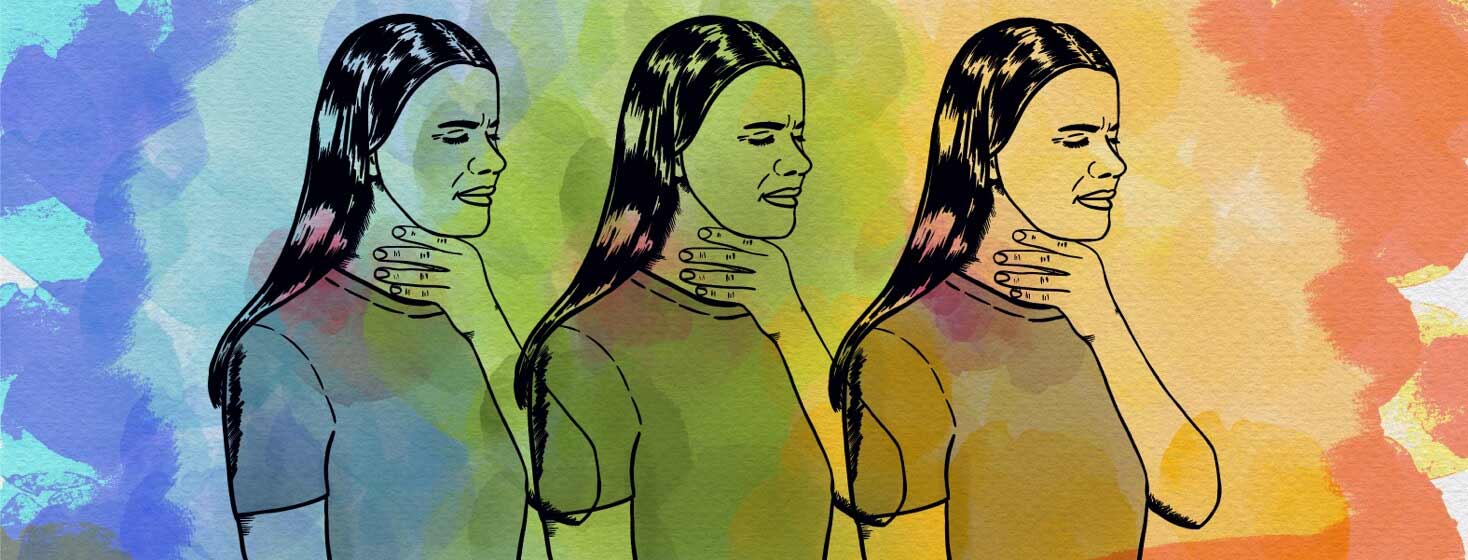Trouble Swallowing? Me, Too!
Among the many MS symptoms I have experienced, there is one I have neglected to write about: dysphagia.
Derived from the Greek “dys” meaning disordered or bad, and "phagia", meaning eat, it reads something like bad eating, which sounds like a perfect way to describe the effect of food poisoning, the taste of burnt toast, or any number of other reasons for having an unpleasant eating experience. In medical jargon, however, dysphagia simply means trouble swallowing. But what does that mean exactly?
Swallowing is, as you might imagine, a complex thing. It happens in three different ways: We do it voluntarily, reflexively, and autonomically. So, let’s break that down a little bit.
Phases of swallowing
- Oral phase - Uses voluntary muscle movement to pulverize and create a food bolus (moistened bit of food).
- Pharyngeal phase - Uses involuntary, reflexive muscle movement. When food reaches the pharynx (upper throat), nerves in the brain stem move it farther along and into the esophagus.
- Esophageal phase - Uses involuntary, rhythmic, coordinated muscle movement as food moves through the upper sphincter and esophagus, through to the lower sphincter, and into the stomach. 1
This or That
When you experience swallowing issues, where do you feel the "stuck" sensation most?
The swallowing process
When we take a bite of food, several things must happen to make it go down smoothly. We need to:1
- Make enough saliva to break it down
- Have proper teeth for chewing if it is solid food
- Have a functioning brain stem to tell the throat muscles to move food from the front to the back of the throat, and then push it along towards the stomach
Swallowing is essential to eating and digestion. This process is the healthiest and most natural way of maintaining our nutritional needs. Yet there are other situations where swallowing can be a problem, too.
MS and developing swallowing issues
- Saliva - Medications can cause dry mouth. This impedes the production of saliva, making it difficult to swallow food without taking a sip of water.
- Chewing - If you are missing the molars necessary to chew solid food into small enough pieces, you can choke trying to swallow it.
- Autonomic (involuntary) movement of food from the esophagus to the stomach - If the brain stem has MS-related nerve damage, this last step can cause food to get stuck before it enters the stomach. 1
Experiencing swallowing issues
Have you ever tried swallowing and couldn't? You are not alone. You could be lying in bed, sitting up, or walking around when it happens. When you bring your tongue up to the palate and close the back of your throat to get ready to swallow—nothing happens! It has happened to me many times.
For me, it started in bed. I was lying on my back and suddenly felt the impulse to swallow saliva that had pooled. I tried to swallow, but nothing happened. Tried twice more, and still nothing. I instinctively cleared my throat and tried again. It worked.
From that point on, clearing my throat seemed to be the solution—until that didn’t work so much anymore. Then I tried changing positions. If I was lying down, I would sit up, which usually worked. It still happens to this day. When it does, I clear my throat, change positions, and keep calm. Eventually, I can swallow again.
This or That
When your swallowing reflex "stalls," what is your go-to instinctive move?
Prevalence of dysphagia in patients with MS
If any of that sounds concerning, it should. A 2020 study of MS patients with dysphagia cited a meta-analysis that found about 43% prevalence of dysphagia in patients with MS—more than the previously estimated one-third.2
It went on to explain that "swallowing may be impaired from lesions in corticobulbar tracts, paresis of cranial nerves, disorders of cerebellum and brainstem, and cognitive dysfunctions." Dysfunction may occur at any of the three stages of normal swallowing [see above] in the mouth, throat, and esophagus. 2
The 2020 article on dysphagia among MS patients went on the state that "dysphagia can cause serious complications such as aspiration pneumonia, malnutrition, dehydration, and airway obstruction." As well as "the high prevalence of patients affected, dysphagia-related disabilities, and the subsequent impact of costs on the family and healthcare system, emphasizes the need for accurate early diagnoses and treatment of dysphagia."2
What's next?
If you experience difficulty swallowing, report it to your medical team. There are tests that can pinpoint where the problem is and how it can be treated. One very effective treatment is working with a speech therapist to learn exercises for strengthening the throat muscles.
You might be rolling your eyes at this and wondering “what’s next? Is there no end to how MS can affect us?” It’s true that we all have enough to deal with when it comes to managing MS symptoms. But dysphagia is a symptom that we really shouldn’t ignore. Doing so could lead to some serious problems down the road.
So, I’m going to take my own advice and report my swallowing problems to my neurologist during my next routine visit in March.

Join the conversation